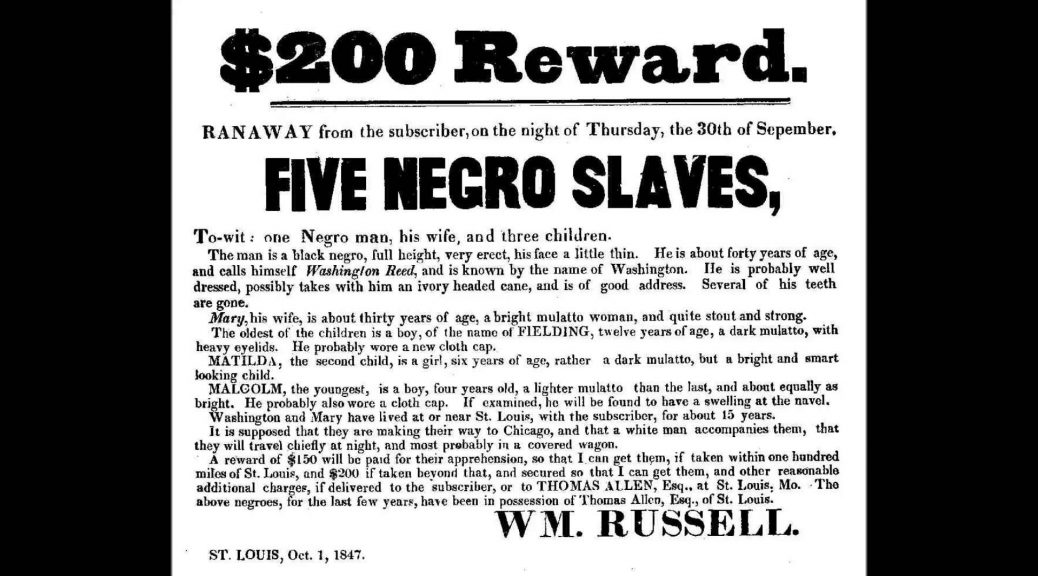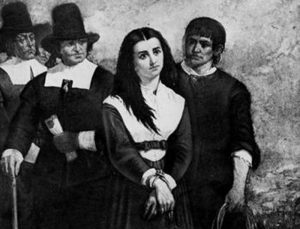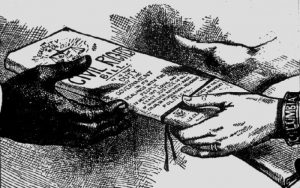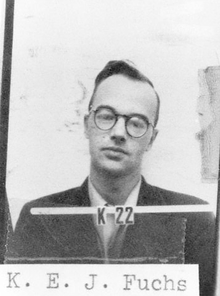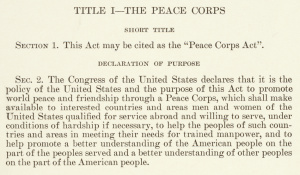March 1 Peace Love Art Activism
DEATH PENALTY
Feminism
March 1, 1692: in Salem Village in the Massachusetts Bay Colony, Sarah Good, Sarah Osborne, and Tituba, an Indian slave from Barbados, were charged with the illegal practice of witchcraft. Later that day, Tituba, possibly under coercion, confessed to the crime, encouraging the authorities to seek out more Salem witches. (see June 10)
Roper v. Simmons
March 1, 2005: in Roper v. Simmons the Supreme Court overruled its 1989 Stanford v. Kentucky decision which allowed the execution of persons who were age 16 or 17 at the time they committed their crimes. In Roper, the Court held that the execution of a person under the age of 18 was disproportionate punishment under the Eighth Amendment and, therefore, was cruel and unusual punishment. (DP, see January 17, 2006; 8th , see May 17, 2010)
March 1 Peace Love Art Activism
BLACK HISTORY
Act for the Gradual Abolition of Slavery
March 1, 1780: Pennsylvania enacted the Act for the Gradual Abolition of Slavery. It guaranteed freedom to non-residents’ slaves after living in Pennsylvania for six months. (see August 7, 1789)
Follow the Drinking Gourd
March 1, 1790: the first U.S. Census count included slaves (though each counted only three-fifths) and free African-Americans, but Indians were not included. During American slavery, songs were an important part of slave culture. One of the best known (though not published until the 1920s) was “Follow the Drinking Gourd.” The song provides coded directions for slaves to escape north. Many artists have covered the song. (see June 21, 1851)
The Civil Rights Act of 1875
March 1, 1875: The Civil Rights Act of 1875 (sometimes called Enforcement Act or Force Act) enacted. It declared: all persons within the jurisdiction of the United States shall be entitled to the full and equal enjoyment of the accommodations, advantages, facilities, and privileges of inns, public conveyances on land or water, theaters, and other places of public amusement; subject only to the conditions and limitations established by law, and applicable alike to citizens of every race and color, regardless of any previous condition of servitude. (BH, see Mar 23; CRA, see October 15, 1883)
Idaho anti-miscegenation law
March 1, 1921: Idaho amended its anti-miscegenation law to include additional restrictions on interracial marriage. Idaho passed its first anti-miscegenation law in 1864, which banned marriage between a white person and “any person of African descent, Indian or Chinese.” The punishment for marrying in violation of the statute was imprisonment for up to two years. Idaho also passed a law banning interracial cohabitation in 1864, violation of which could result in a $100-$500 fine, six to twelve months in jail, or both. The anti-miscegenation law was amended in 1867 to increase the range of fines and the maximum possible prison time to ten years. In 1921, the law was amended again to ban marriage between whites and “mongolians, negroes, or mulattoes,” although the state’s population at the time was less than .02% African American. The Idaho state legislature repealed the anti-miscegenation law in 1959.
Idaho was not unique in its attempts to obstruct marriage between the races. In the 1920’s, Social Darwinism had captured the attention of the country’s elite, who became concerned with maintaining and promoting the eugenic racial purity of the white race by controlling procreation. Concerned that states were not adequately enforcing their anti-miscegenation laws, eugenicists pushed for stronger measures against racial mixing and stricter classifications to determine who qualified as white when seeking a marriage license. Like Idaho, many states added the racial category “mongolian” during this time in response to an influx of Japanese immigrants to the United States. (see Apr 5)
Alabama State College
March 1, 1960: over 1000 people marched from the Alabama State College campus to the state capital and back. After this march, the president of the university expelled 9 students identified as leaders and suspended 20 other students, under pressure from the governor’s office. As a result of this, students at the college voted to boycott classes and exams. (next BH, see Mar 29: see G4 for expanded chronology)
Malcolm X & Muhammad Ali
March 1, 1964: Cassius Clay met with Malcolm X in NYC. ( 2016 NPR report about the relationship between both men) (next Ali, see Mar 3; next MX, see Mar 8)
George Whitmore, Jr
March 1, 1965: Gerald Corbin, a juror in the Elba Borrero case, testified at a hearing before Justice Malbin on the motion for a new trial that “practically everyone” on the jury knew that George Whitmore, Jr. had been charged with the Wylie-Hoffert crime. According to Corbin, one of his fellow jurors had stated, “This is nothing compared to what he is going to get in New York.“
Corbin also testified that at least one juror “on more than one occasion” used racial slurs referring to the sexual proclivities of Negroes and Puerto Ricans. “Whitmore,” said the juror in question, “was guilty of attempted rape because Negros are “like jackrabbits” and “got to have their intercourse all the time.” An FBI report, which the prosecution had withheld at the trial, was introduced at the hearing. It stated that the button Borrero ripped from her assailant’s coat differed in size and color from the buttons on the tan poplin raincoat Whitmore was wearing when he was taken into custody. (see Whitmore for expanded story)
Ben Chester White murder
March 1, 2003: after just three hours of deliberations and a three-day trial, a jury of nine whites and three blacks found Ernest Avants, 72, a former Klansman guilty of murdering Ben Chester White as part of a beer-inspired plot to draw Dr. King down to them.
Avants will die in prison on June 16, 2004. (2014 Clarion-Register article) (next BH, see Mar 26)
March 1 Peace Love Art Activism
Women’s Health
Emma Goldman
March 1, 1916: Goldman spoke at a birth control mass meeting held at Carnegie Hall in New York City. Other speakers include Margaret Sanger, Leonard Abbott, Gilbert E. Roe, Theodore Schroeder, Bolton Hall, John Reed, Anna Strunsky Walling, Dr. William J. Robinson and Dr. A. L. Goldwater. (see Goldman for expanded story; WH, see October 16, 1916)
Family planning services
March 1, 1966,: in a Special Message to Congress on Domestic Health and Education, President Lyndon Johnson called for federal support for family planning services. The first federal support for family planning occurred on November 2, 1965, as part of Johnson’s Great Society program, and the War on Poverty in particular. Federal support became institutionalized in 1970 with the Family Planning Services Act, which President Richard Nixon signed into law on December 26, 1970. In the late 1960s and 1960s, most Republican Party leaders supported both birth control and federal aid for family planning services. That changed in the late 1970s when social conservatives captured control of the GOP and advanced and anti-abortion, anti-birth control, and anti-feminist agenda.
The fight for the legal availability of birth control and family planning services was a long one. On October 16, 1916 Margaret Sanger opened the first birth control clinic in America. She was arrested a week later for violating New York state law, and eventually served a month in jail. A major breakthrough was the Supreme Court’s decision in Griswold v. Connecticut on June 7, 1965, which struck down a Connecticut law prohibiting birth control services and which established a constitutional right of privacy. (NYT abstract) (see Sept 6)
March 1 Peace Love Art Activism
US Labor History
U.S. Steel
March 1, 1937: CIO president John L. Lewis and U.S. Steel President Myron Taylor signed a landmark contract in which the bitterly anti-union company officially recognized the CIO as sole negotiator for the company’s unionized workers. Included: the adoption of overtime pay, the 40-hour work week, and a big pay hike (see Mar 18)
Colin Kaepernick
March 1, 2017: the San Francisco 49ers announced that quarterback Colin Kaepernick opted out of the final season of his contract with the organization in order to become an unrestricted free agent. (ESPN article) (Labor, see Apr 26; next CK, see Aug 12 or see Colin for expanded chronology)
West Virginia teacher strike
March 1, 2018: all of West Virginia’s schools remained closed despite the tentative deal between union leaders and Gov. Jim Justice on Feburary 27. Teachers had taken to the halls of the state’s Capitol during a “cooling off” period to voice their ongoing frustration with the negotiations.
Many of them demanded that the unions and legislators get back to the bargaining table to improve a deal they deemed unsatisfactory. (Labor & WV, see Mar 2)
March 1 Peace Love Art Activism
Cold War & Nuclear/Chemical Weapons
March 1, 1950: German-British atomic scientist Klaus Fuchs was sentenced to 14 years in prison by a UK court for passing British and American nuclear secrets to the Soviet Union. (1988 LA Times obit) (CW, see Mar 8; NN, see June 17)
Castle Bravo
March 1, 1954: Castle Bravo was the code name given to the first US test of a dry fuel thermonuclear hydrogen bomb, detonated at Bikini Atoll, Marshall Islands, The blast’s 15 megaton yield, far exceeded the expected yield of 4 to 6 megatons. That, combined with other factors, led to the most significant accidental radiological contamination ever caused by the US. Fallout from the detonation — intended to be a secret test — poisoned some of the islanders upon their return, as well as the crew of a Japanese fishing boat, and created international concern about atmospheric thermonuclear testing. (Brookings article) (see June 14, 1954)
Peace Corps
March 1, 1961: President Kennedy issued Executive Order #10924, establishing the Peace Corps as a new agency within the Department of State. The same day, he sent a message to Congress asking for permanent funding for the agency, which would send trained American men and women to foreign nations to assist in development efforts. The Peace Corps captured the imagination of the U.S. public, and during the week after its creation thousands of letters poured into Washington from young Americans hoping to volunteer. (text of order) (next Cold War entry is Bay of Pigs )
Russian arsenal
March 1, 2018: Russian President Vladimir Putin said his nation had developed a new arsenal of “invincible” nuclear weapons that could reach “anywhere in the world.” Among the weapons claimed by Putin was a nuclear-powered, nuclear-armed cruise missile with unlimited range; a nuclear torpedo; and a new class of submarine-launched, long-range missiles. (see Mar 6)
March 1 Peace Love Art Activism
TERRORISM
Puerto Rican nationalists
March 1, 1954: Puerto Rican nationalists opened fire from the gallery of the U.S. House of Representatives, wounding five congressmen. (NYT article) (see February 16, 1965)
Khalid Shaikh Mohammed
March 1, 2003,: suspected Sept. 11 mastermind Khalid Shaikh Mohammed was captured by CIA and Pakistani agents near Islamabad. (CNN article) (see Nov 25)
March 1 Peace Love Art Activism
March 1 Music et al
March 1, 1958: Bob Dylan’s Golden Chords played at the National Guard Armory in Hibbing, MN. It was the first time he was paid to perform on Stage. (see January 31, 1959)
March 1 Peace Love Art Activism
Vietnam
3,500 U.S. Marines
March 1, 1965: US Ambassador Maxwell Taylor informed South Vietnamese Premier Phan Huy Quat that the United States was preparing to send 3,500 U.S. Marines to Vietnam to protect the U.S. airbase at Da Nang. (see Mar 2)
Daniel Ellsberg/Pentagon Papers
March 1, 1968: Clark Clifford replaced McNamara as secretary of defense. (see Papers for expanded story)
Oh! What a Lovely War
March 1, 1969: the British black comedy film Oh! What a Lovely War released in Britain. While ostensibly a story about World War I, it paralleled and reflected many of the sentiments people felt toward the Vietnam conflict. (see March 18)
Weather Underground
March 1, 1971: the Weather Underground bombed the US Capitol building claiming it to be in protest of US involvement in Laos. The bomb exploded in a Capitol restroom 30 minutes after a telephone warning. Some $200,000 in damage was caused with no injuries. (see Mar 23)
March 1 Peace Love Art Activism
Space Race
March 1, 1966: Venera 3, a Soviet probe launched from Kazakhstan on November 15, 1965, collided with Venus. Although Venera 3 failed in its mission to measure the Venusian atmosphere, it was the first unmanned spacecraft to reach the surface of another planet. (Wired article) (see Mar 16)
March 1 Peace Love Art Activism
Watergate Scandal
March 1, 1974: seven people, including former Nixon White House aides H.R. Haldeman and John D. Ehrlichman, former Attorney General John Mitchell and former assistant Attorney General Robert Mardian, were indicted on charges of conspiring to obstruct justice. (see Watergate for expanded story)
March 1 Peace Love Art Activism
Irish Troubles
March 1, 1981: Bobby Sands, a Provisional Irish Republican Army member, began a hunger strike for political status in Long Kesh prison. (see Troubles for expanded chronology)
March 1 Peace Love Art Activism
Religion and Public Education
March 1, 1984: the Hicksville, New York, Junior High School announced that it was dropping its mandatory 30 second meditation or prayer period for students. The school’s written policy called for “silent prayer or meditation according to the beliefs or desires of individual students.”
The Nassau County chapter of the ACLU had threatened to sue on behalf of several parents who complained that the policy created an establishment of religion in violation of the Establishment Clause of the First Amendment.
The Supreme Court declared an Alabama “moment of silence” unconstitutional as a violation of the Establishment Clause in Wallace v. Jaffree on June 4, 1985. (NYT article) (Religion, see Aug 11; Separation, see Mar 5)
March 1 Peace Love Art Activism
Dissolution of Yugoslavia & INDEPENDENCE DAY
March 1, 1992: Bosnia Y Herzegovina independent from Yugoslavia. (DY, see Apr 28; ID, see July 17)
March 1 Peace Love Art Activism
LGBTQ
Maryland
March 1, 2012: Maryland Governor Martin O’Malley signed the freedom to marry into law after it passed out of the state Senate and House. Almost immediately after its passage, anti-gay activists begin collecting signatures to place a measure on the November ballot that would overturn the freedom to marry. (see Mar 21)
Bethany Christian Services
March 1, 2021: Bethany Christian Services, a Michigan-based evangelical organization, and one of the country’s largest adoption and foster care agencies, announced that it would begin providing services to L.G.B.T.Q. parents nationwide effective immediately, a major inflection point in the fraught battle over many faith-based agencies’ longstanding opposition to working with same-sex couples.
Bethany announced the change to about 1,500 staff members that was signed by Chris Palusky, the organization’s president and chief executive. “We will now offer services with the love and compassion of Jesus to the many types of families who exist in our world today,” Mr. Palusky wrote. “We’re taking an ‘all hands on deck’ approach where all are welcome.” [NYT article] (next LGBTQ, see Mar 15)
March 1 Peace Love Art Activism
Sexual Abuse of Children
Diocese of Altoona-Johnstown
March 1, 2016: Pennsylvania state Attorney General Kathleen Kane announced that a statewide investigating grand jury into the Roman Catholic Diocese of Altoona-Johnstown had determined that hundreds of children were sexually abused over a period of 40 years. At least 50 priests or religious leaders had been involved in sexual abuses, she said. Evidence and testimony gathered by the grand jury revealed a history of diocese superiors taking action to conceal the child abuse as part of an effort to protect the institution’s image. (PennLive article) (see June 4)
Vatican resistance
March 1, 2017: Irish abuse survivor Marie Collins accused the Vatican of “shameful” resistance to fighting clerical sex abuse in the Catholic Church as she resigned from Pontifical Commission for the Protection of Minors, a key panel set up by Pope Francis in 2013 to deal with the issue.
“There are people in the Vatican who do not want to change or understand the need to change,” said Ms Collins. “I can’t stick with it any more. They are not co-operating with the commission.” (Telegraph article) (see July 28)
March 1 Peace Love Art Activism
Environmental Issues
March 1, 2024: the Biden administration issued new rules designed to prevent disasters at almost 12,000 chemical plants and other industrial sites nationwide that handle hazardous materials.
The regulations for the first time tell facilities to explicitly address disasters, such as storms or floods, that could trigger an accidental release, including threats linked to climate change. For the first time, chemical sites that have had prior accidents will need to undergo an independent audit. And the rules require chemical plants to share more information with neighbors and emergency responders.
“We’re putting in place important safeguards to protect some of our most vulnerable populations,” Janet McCabe, Deputy Administrator of the Environmental Protection Agency, told reporters ahead of the announcement. [NYT article] (next EI, see Mar 6)

